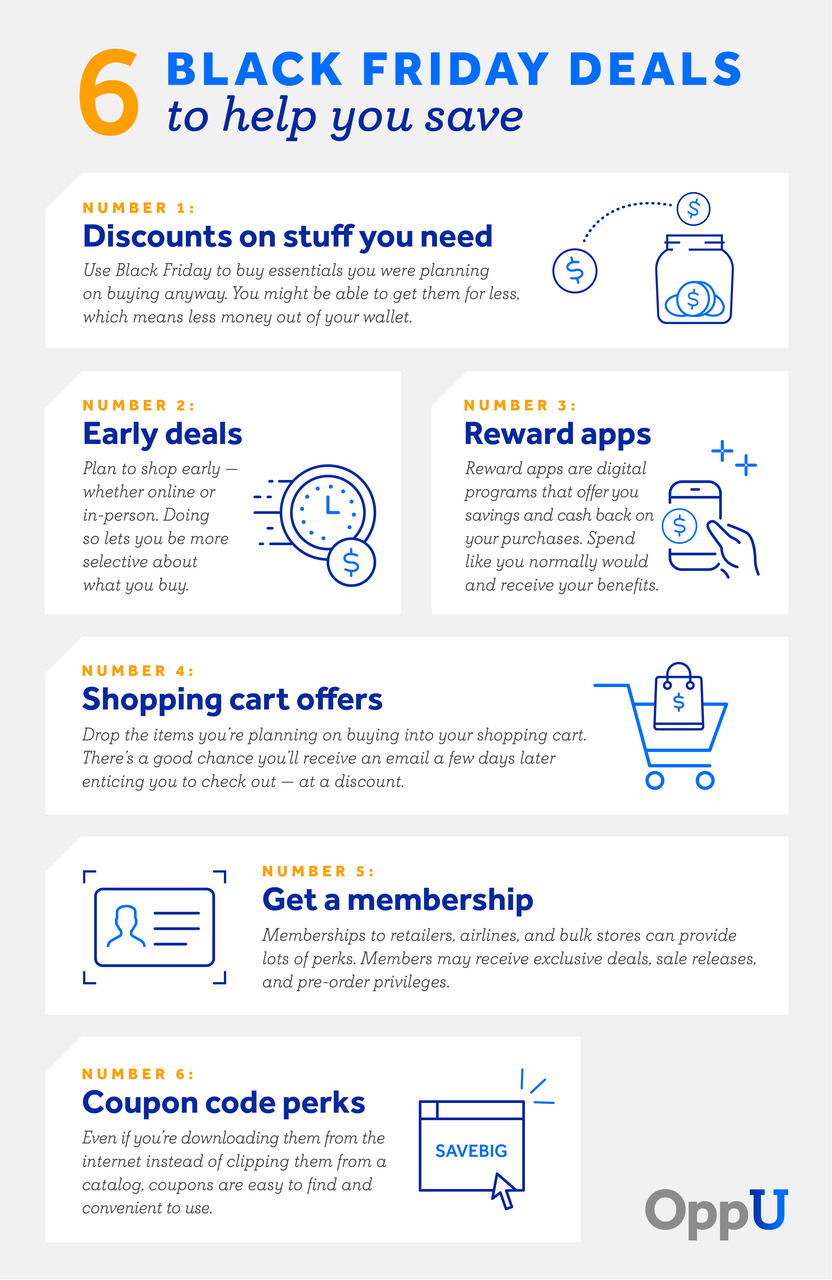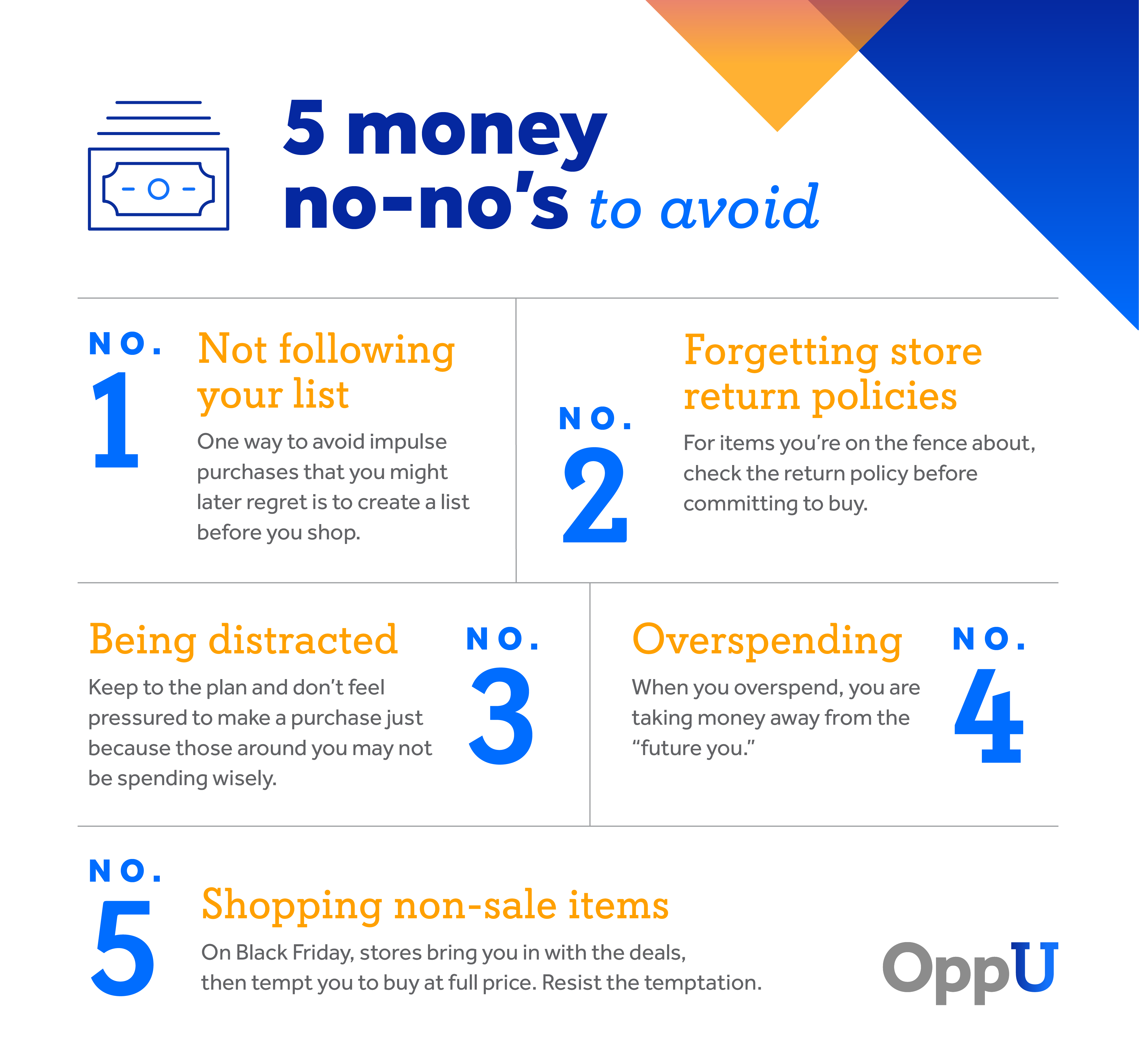What Is a Black Friday Deal? And What’s the Difference Between a Black Friday Sale, a Money No-No — or Even a Scam?

Sale time! Black Friday is almost here and you’re ready to spend because everything is cheap, and the deals are too good to pass up.
But wait.
While Black Friday discounts can be tempting, not everything you see is a smart buy. And those too-good-to-be-true deals may not be deals at all — they may be scams.
6 Black Friday deals to help you save
Know what to look for before you shop. Is it a deal? A money no-no? A scam? Here’s how to tell the difference, and how you can make the most of your money without getting carried away this holiday season.

No. 1: Discounts on stuff you need
Want to get your money’s worth on Black Friday? Here’s how:
Buy the stuff you need, but get it at a discount. It’s that simple.
Before you shop, separate your “needs” from your “wants.” Look for deals on the “need” items. Use Black Friday to buy essentials you were planning on buying anyway. You might be able to get them for less, which means more money in your pocket.
A new coat to replace the one you wore out last winter. A toaster, coffee maker, or other kitchen appliance. Black Friday is a great chance to make necessary purchases on the cheap.
No. 2: Early Black Friday deals
Scoring the best Black Friday deals isn’t a single-day event anymore. Take advantage of sales in the weeks leading up to Black Friday.
Plan to shop early — whether online or in-person. Doing so lets you be more selective about what you buy. So do a deep search for your must-have purchases. Is it an air fryer this year? Those earbuds or video games that you promised your teenage kids for Christmas? When you find the best Black Friday-worthy deal, see if it’s offered for less somewhere else. You have time.
Bonus tip: Another good idea when shopping early is to hold yourself to a cooling-off period; before you make a purchase, give yourself a day or two to think it over. This can help you avoid impulse buys and succumbing to Black Friday ads, which are all too tempting when shopping the day-of.
No. 3: Reward apps
Make money by spending money? It’s possible with reward apps.
Reward apps are digital programs that offer savings and cash back on your purchases. Sign up online or download them on your phone. Spend like you normally would and receive your benefits. It’s simple.
Popular reward apps include:
- Fetch Rewards rewards you for your purchases. Just scan your receipt and receive points that you can redeem toward items in a variety of categories — retail, sweepstakes, restaurants, entertainment, subscriptions, and more.
- Swagbucks offers gift cards for completing online polls, surveys, and questionnaires.
No. 4: Shopping cart offers
Have you ever browsed a website, put a few things in your cart, and shut off your computer before making the purchase? There’s a good chance you received an email a few days later enticing you to check out at a discount.
In the world of online shopping, companies will go to great lengths to make a sale. Use it to your advantage.
If you know you are going to make a purchase somewhere, join the company’s email list days/weeks before you plan to shop, so they can contact you with offers. Drop the items you plan to buy into your shopping cart. Then wait and check your inbox. You might find a pleasant surprise.
No. 5: Get a membership
Do people sign up for memberships anymore? They sure do, and with good reason.
Memberships to retailers, airlines, and bulk stores can provide lots of perks. Members may receive exclusive deals, sale releases, and pre-order privileges, so consider signing up.
Other benefits include rewards programs, gift cards, free shipping, and blackout dates that are only available to members. During Black Friday, this can help make gifting a flight, gift card, or care packages a more affordable option for the coming holiday season.
No. 6: Coupon code perks
No matter what, a coupon will never go out of style. Even if you’re downloading them from the internet instead of clipping them from a catalog, coupons are easy to find and convenient to use.
One nifty trick to help you save on holiday gifts? Before you shop at a store, sign up for their email list. You just might find a money-saving coupon in your inbox in the coming weeks.
Need another option? There are online sites that offer redeemable discounts on select products from some of your favorite retailers and restaurants. RetailMeNot is known for offering trending deals by category and savings on select full-price items.
Whether your Black Friday purchases are beauty, entertainment, or gifting needs, there are a variety of options from which to choose. Once you select the deal you want, the digital coupon code can be copied and pasted in the coupon section of the actual site you want to make your purchase. Simply copy or type in the code.
5 Money no-nos to avoid
On Black Friday, you’re sure to encounter sale signs everywhere that advertise epic deals, deep discounts, and limited-time offers. But just because something’s on sale doesn’t mean it’s a good use of money. Here are 5 money no-nos to avoid.

No. 1: Not following your list
One way to avoid impulse purchases that you might later regret is to create a list before you start your holiday shopping. Use a journal or take notes on your phone. Consider checklist apps. When you come across something you want that isn’t on your list, drop the temptation and keep moving. If it’s that important, you can always make a new list for a second trip — that item isn’t going anywhere.
Stick to what you want to purchase and don’t get caught in upsells. This is where you’re offered one thing but it requires another purchase to make it work. Or, in some cases, there’s a comparable item but it’s missing key features that you need. If there is a particular product you’re looking for, don’t opt for something of lesser value just because it has a markdown.
No. 2: Forgetting store return policies
Return policies give you an easy out when you buy something you didn’t actually want. They typically range from a few days to a month, but during the holiday rush, there may be changes to return eligibility.
For items you’re on the fence about, check the return policy before committing to buy. This is especially true with clothes, which may not fit exactly how you want.
No. 3: Distractions
It’s fun to have company while scoring on shopping deals, but it’s not fun to spend more than your budget allows because the people around you are influencing your purchases. Keep the plan you had in mind for yourself, and don’t feel pressured to make a purchase just because those around you are not spending wisely.
Another distraction to avoid is impulse buys in the checkout line. Candy bars, earphones, tabloids; we’ve all been there — first you stare, then you pick it up, and then it finds its way into your cart during check out. Stick to your list, and make sure you’ve eaten prior to shopping so you aren’t tempted with snacks or daily deals that could shift your attention.
Stay focused. Don’t take calls — chatting and shopping is an easy way to end up with more in your shopping cart than you intended. When you’re shopping to save, distractions can be costly.
No. 4: Overspending
There are a variety of reasons that overspending happens. Most people are on autopilot — either swiping their plastic cards or using cash as king. The problem is bigger than you think.
When you overspend you are taking money away from the “future you.” Life’s expenses are inevitable. There may be a medical bill, groceries, car troubles, or family members to help. Overspending is a matter of self-control and discipline.
Common reasons for overspending include:
- Credit card misuse: Credit cards are convenient, but they can also lead to overspending. Only buy what you can afford to pay off at the end of the month.
- Unbudgeted cash: Cash in your pocket? That doesn’t necessarily mean you should spend it. Before shopping, only take out the cash you need for the items on your shopping list.
- Debit card machines: Everywhere you go there is a swipe, chip, or tap feature. There are even virtual wallets where your debit card can be digitally stored on your smartphone. Technology is making spending easier, but it’s also making it easier to overspend. So when you’re shopping, slow down — all those swipes can add up.
- Spending temptations: Especially on Black Friday, shopping comes with temptations. There are deals, but there’s everything else in the store, too. Stay focused.
No. 5: Shopping nonsale items
Black Friday deals are great for shoppers, but what’s in it for the stores, you might ask? Easy: money.
Stores want you to spend on Black Friday and during the rest of the holiday shopping season, too. They bring you in with the deals, then tempt you to buy at full price.
So resist the temptation.
Stick to your list and only buy what’s on sale, because everything you buy at full price is money that could have gone toward a purchase that helps you save. And all those full-price items? They’re not going anywhere. If you decide you really want a fancy robot vacuum or smart home device, come back later; perhaps when the store puts it on sale.
Watch for these 6 Black Friday scams
Does a deal sound too good to be true? It probably is. Black Friday is a great time to save, but only if you do it right. Shop smart by avoiding scams and taking advantage of deals that deliver real discounts.
Scam No. 1: No discounts
Black Friday means everything is on sale, right? Wrong.
Looking at a list of reduced prices, you might assume that everything is a steal. But that’s not always the case. Retailers slip in full-price items alongside the ones they slash. This can confuse shoppers or create an everything-must-go frenzy that encourages impulse purchases.
Before you buy, double-check the price tag. If the item doesn’t come at a discount, skip it. You can always pick it up later when it’s actually on sale.
Scam No. 2: Fake discounts
Prices can be deceiving. One price you’re likely to come across while Black Friday shopping is the MSRP, or manufacturer suggested retail price. The MSRP is set by the manufacturer, but individual stores are free to charge less. If you see a discount to an MSRP, beware. Many stores never charge the full price, so a discount based on an MSRP may not be a discount at all.
To avoid this type of scam, do some comparison shopping. If other stores — or the store where you’re shopping — sell the same item below the MSRP as their regular price, you’re not getting the deal you think you are.
Scam No. 3: Last year’s price
Many stores recycle the previous year’s sale. For some items, this isn’t a problem. For others, last year’s model is old news and should be priced accordingly. Electronics, for instance, lose value fast. So when a store sells a model for the same price year after year, you’re probably not getting a bargain no matter how deep the discount.
Keep an eye out for this type of scam when buying electronics, appliances, and even clothes, which age as soon as the styles go out of fashion.
Scam No. 4: Downgraded models, downgraded deals
Did you find a rock-bottom price? Make sure it’s a sale and not a downgrade. Retailers will sometimes strip a product of its features and sell it at a steep discount price (think of a laptop that’s so basic, it’s almost unusable). While the price may look good, remember: you get what you pay for.
Before you buy, price it out. Account for all the features you will need to make the purchase worth it, and make sure you’re still happy with the price.
Scam No. 5: Limited quantities
Ever seen people lined up outside a store on Black Friday? Chances are they’re hoping to score a deal with “limited quantities.” Retailers offer these too-good-to-be-true deals on a select number of items, and once those units are sold, the sale is over.
This type of sale is great if you’re one of the lucky few who get them. Everyone else misses out, and this is how retailers make their money. Once shoppers are in the store, they’re likely to make a purchase, even if it’s at full price.
Scam No. 6: Store gift cards
Stores will often sell an item for full price with the inclusion of a free gift card. It sounds like a good deal, right? So how is this a scam? If you don’t use the gift card at a later date, you’re not getting a deal, so consider if you are actually going to return to the store down the road. Is the store out of the way? How often do you shop there?
Think of all the unused gift cards sitting in your wallet; if the gift card you receive becomes one of them, you’re better off looking for a different deal.
Expert tips to avoid online Black Friday scams
Cyber Monday rounds out the five-day holiday shopping rush. In 2023, it generated $12.4 billion in online sales in the U.S.. But scams abound, and shoppers face digital risks like data theft, too.
To learn more, we talked to J.R. Skrabanek, Esq., an attorney with a background in consumer protection and certified privacy professional. Here are his three tips for staying safe online:
Tip No. 1: Avoid too-good-to-be-true deals
“First, consumers should avoid deals that seem too good to be true. If a deal seems too good to be true, it almost always is,” Skrabanek says. The same scams that retailers use in brick-and-mortar stores are used online. If it seems like an unusually good bargain, take another look to be sure it’s legitimate.
Tip No. 2: Make purchases on secure payment websites
Second, consumers should only make purchases from sites that can secure your personal information with secure sockets layer (SSL) protection, Skrabanek says. SSL technology creates a secure, encrypted connection between a shopper and a website. This ensures that private data, such as credit card information, isn’t compromised.
Tip No. 3: Verify a company’s legitimacy
“Third, consumers would be wise to check a seller or merchant’s reviews prior to purchase,” Skrabanek says. “Though reviews can be faked, more reviews [are] usually a sign of legitimacy.”
The Better Business Bureau is a great place to start. Shoppers can view ratings, search reviews, and browse both resolved and unresolved claims against a business.
The bottom line
Black Friday is a staple for savvy shoppers. To get your money’s worth, know what to look for and what to avoid this holiday season.

J.R. Skrabanek, Esq. is a Partner at Thompson & Skrabanek, PLLC His practice focuses on all types of business and commercial litigation, including contracts, real estate, debt defense, and consumer law, amongst others.
Please note the below article contains links to external sites outside of OppU and Opportunity Financial, LLC. These sources, while vetted, are not affiliated with OppU. If you click on any of the links you will be sent to an external site with different terms and conditions that may differ from OppU’s policies. We recommend you do your own research before engaging in any products or services listed below. OppU is not a subject matter expert, nor does it assume responsibility if you decide to engage with any of these products or services.


